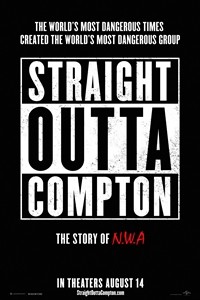 “’Straight Outta Compton’ feels like a complete document of N.W.A’s reality”
Director: F. Gary Gray
“’Straight Outta Compton’ feels like a complete document of N.W.A’s reality”
Director: F. Gary Gray
Writers: Jonathan Herman, Andrea Berloff
Distributor: Universal Pictures
“Our art is a reflection of our reality.”
Ice Cube (O’Shea Jackson Jr., who is Ice Cube's son in real life), of the seminal rap band, N.W.A, utters these words in a press conference to defend his group’s “questionable-to-the-mainstream” lyrical content to a large collection of jumpy journalists. His statement was exactly right, and director F. Gary Gray creates a glorious work of art of his own: a completely captivating and Shakespearean story of five men from Compton, CA and their meteoric rise up the music charts in “Straight Outta Compton”.
In this 2 hour 27 minute chronicle, Gray introduces the audience to Ice Cube, Dr. Dre (Corey Hawkins), Eazy-E (Jason Mitchell), Dj Yella (Neil Brown Jr.), and MC Ren (Aldis Hodge) and their humble beginnings in a stressful environment in 1988 Compton.
Their reality was a place where gangs (like the Crenshaw Mafia) stop school buses and point guns at the heads of high school kids.
Their reality was a place where white police officers routinely provoke, harass and manhandle young black men for absolutely no reason.
Their reality, however, was also a place where Dr. Dre – sporting a stylish, opened buttoned Los Angeles Dodgers jersey – earns fifty dollars for DJing at a club.
Although his mom was not impressed, Dr. Dre proudly states, “It’s a start."
Dr. Dre’s talents are with writing music, and his friend Ice Cube is more than a bit of a poet. Although music and lyrics are the basic ingredients for a song, they need money and studio time to actually make a record.
Enter Eazy-E.
With his business know-how, he helps build that magical studio time bridge. Add Dj Yella and MC Ren, and the group is complete. N.W.A is born on Ruthless Records, and their frank talk of crime, racism, injustice, and frustration strikes a chord (pardon the pun) in Los Angeles and soon, the nation.
Along the way, Gray does a very nice job of showing the camaraderie between the band members and the joy they experience while creating music inside the studio and during thunderous performances in arenas. The arena shows are highly produced, and the power of the actors’ recreated performances brings chills. With their live concert stage supporting a barbed-wire fence and huge letters “N.W.A” plastered in red, these five men make a statement to the movie theatre and on-screen audiences alike, and we feel it to our core.
These guys are very likable, and with the film’s very clear “us vs. the system” tone, this audience member really hoped bandmate harmony would remain strong. On the other hand, life harmonies sometimes fall flat, and the film reveals the squabbles and issues which created serious problems. Ironically, with ever-present racism surrounding the N.W.A members, treating one another with equality would be the obvious choice, but money can pull apart even the closest of friends. We also see the band’s allies might not have their best interest in mind as well.
Trust becomes an issue everywhere, and that is an unfortunate - but very real message - in the film. Gray’s movie also does a meticulous job of documenting N.W.A’s journey and does so with humor, growth, success, and conflict.
This is a landmark band, and the movie seems to include every small, but important step on their ride. This is mostly positive, but the film also includes actors playing other rap artists during these small steps, and their bit cameos felt like a celebrity checklist. The look-alike actors’ small appearances took me out of the narrative, while I wanted the real focus to continue on N.W.A. That’s a small criticism, however, because walking out of the movie, I felt like I was treated to a complete, historical and fascinating document of this band and a clear picture of their reality. (3.5/4 stars)









